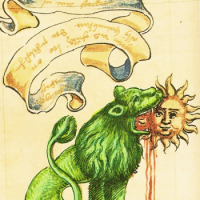Messaggi: 8
Lingua: English
Sunjo (Mostra il profilo) 31 agosto 2014 16:40:39
Alkanadi (Mostra il profilo) 31 agosto 2014 16:50:28
Sunjo:http://de.urbandictionary.com/define.php?term=Trut...I don't know but this is my guess:
Veranto
I think it means the one who has the truth.
Or, maybe this works:
Veristo
Sunjo (Mostra il profilo) 31 agosto 2014 19:31:48
And yes, of course konspiristo would be the better name for them, but here it matters how they call themselves.
Polaris (Mostra il profilo) 01 settembre 2014 07:39:07
Sunjo:Thanks. I think I will use "veristo" because the google-search for veristo was slightly more convincing than for veranto.When translating, it's important to recognize times when circumlocution is a better choice than the coining of new words (or the use of transliterated phraseology with meanings obscured by a lack of context). When someone uses the expression "truther" in English, it evokes the context of doubts about the government embodied in the word "birther" (meaning those who doubt that Obama was really born in the U.S.) Absent that context, "truther" sounds like "one who adheres to the truth".
And yes, of course konspiristo would be the better name for them, but here it matters how they call themselves.
Since the term is going to have to be explained anyway, why not just cut to the chase say what you mean rather than trying to coin a new term that nobody is going to understand? How about "komplot-teoriisto pri 9-11" or something similar? You may still have to briefly tell what you mean the first time you use the expression, but it's going to be a lot less cumbersome in the long run than using a made-up term that essentially would amount to speaking English with Esperanto words.
Alkanadi (Mostra il profilo) 01 settembre 2014 09:45:47
Sunjo:Thanks. I think I will use "veristo" ...I was thinking that maybe this isn't the best name because it lacks the conotations that are embodied in the English word. Maybe, since Truther is a title given to someone, it should be Truthero. Just like like names can be Esperantized.
For example:
John = Johano
Tyler = Tajlero
Christian = Kristano
Jew = Judo
Democrat = Demokrato
Republican = Respublikano
Truther = Truthero
If you use Veristo then make sure to capitalize it so people know that it is a title.
But, I am a noob so I don't know.
erinja (Mostra il profilo) 01 settembre 2014 14:46:19
Also, I wouldn't say 9/11 in Esperanto. In a lot of countries it's rendered as 11/9, so you'd be better off saying "dek unua de septembro".
Sunjo (Mostra il profilo) 01 settembre 2014 16:56:46
Polaris:Yes, that's true, but in this case I'm not worried about it, because the word gets explained and the context is given.
When translating, it's important to recognize times when circumlocution is a better choice than the coining of new words (or the use of transliterated phraseology with meanings obscured by a lack of context). When someone uses the expression "truther" in English, it evokes the context of doubts about the government embodied in the word "birther" (meaning those who doubt that Obama was really born in the U.S.) Absent that context, "truther" sounds like "one who adheres to the truth".
Polaris:Since is has to be explained anyway I prefer afterwards a shorter word.
Since the term is going to have to be explained anyway, why not just cut to the chase say what you mean rather than trying to coin a new term that nobody is going to understand? How about "komplot-teoriisto pri 9-11" or something similar? You may still have to briefly tell what you mean the first time you use the expression, but it's going to be a lot less cumbersome in the long run than using a made-up term that essentially would amount to speaking English with Esperanto words.
In German the word "truther" (not translated) is already used in a broader sense, not only for 9/11-conspiracy-believers, but generally for people who tend to believe all kinds of conspiracy-theories, which is the second reason why I would not use "komplotteoriisto pri 9-11"
Truthero would be an option, but I do not like it. Possibly because it almost could be a word in Esperanto, although trutheroo would not make much sence.

mbalicki (Mostra il profilo) 02 settembre 2014 13:32:14
Alkanadi:Maybe, since Truther is a title given to someone, it should be Truthero. Just like like names can be Esperantized.Well, I can't agree with you on this one.
For example:
John = Johano
Tyler = Tajlero
Christian = Kristano
Jew = Judo
Democrat = Demokrato
Republican = Respublikano
Truther = Truthero
If you use Veristo then make sure to capitalize it so people know that it is a title.

Words like demokrat·o, republik·an·o, krist·an·o (which should be ĥrist·an·o, but nvm) or jud·o are following internationally recognised roots, which are present in Esperanto because of the very nature of it. To some extend that's also the case of the infix ·an·, and that's what makes words having it sound sometimes familiar. However, in the case of this kind of words, if Esperanto allows to create a word which is structurally more reasonable, then that one is used (compare “مسلم” with islam·an·o http://bit.ly/1usCE3z).
Proper nouns is a totally different story. Every language has got its phonetic and grammar rules, therefore there are few stages of assimilating proper nouns from one language to another. I can distinguish 6 of them:
0. no assimilation — no change — 和歌山
1. script — using the right script — Wakayama
2. alphabet — using the right set of characters — Ŭakajama
3. phonetics — obeying relations between them — Vakajama
4. grammar — shaping the word properly — Vakajamo
5. etymology — using own roots and patterns — Junmonto
Stopping at any of these stages can serve different purposes; may depend on the preferences of the user or on the type of the proper noun we're dealing with. As you noticed, personal names are sometimes (depends on whose any by whom) esperantised to the extend of stage 5, so that we have Johan·o, Miĥael·o, Hedvig·a or Paŭlin·a.
So, going back to the funny people misleadingly calling themselves “truthers”: Firstly, I'd argue there is no reason to treat this word as a proper noun; no reason to consider it a “title” of any kind, that they're giving to themselves. If however, that was the case (or one would just prefer to treat it that way), then esperantising it as “truthero” is not the best idea (unless one intentionally wants it to be pronounced as /trut.'he.ro/), and I'd recommend considering “trutero”, “trufero” or “ĉrufero”.
But, since I think one should treat it as a word deriving the meaning exclusively from its structure, I'd much rather go with ver· + some adequate ending. The nicest option would be ·ul·o — “truther” understood as “a person concerning the truth”. But since ver·ul·o already has got its meaning (Rev 3:7), then choosing between ver·ant·o and ver·ist·o I'd pick the latter, because the former sounds more like “a person who verifies”.
Alkanadi:But, I am a noob so I don't know.Well, I'm also a n00b. Don't listen to me.






